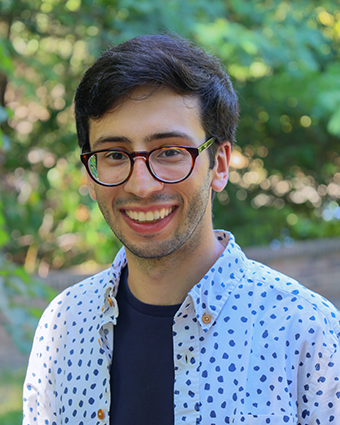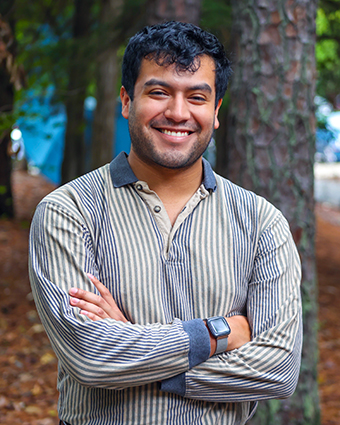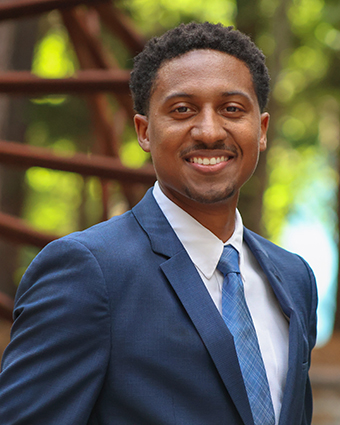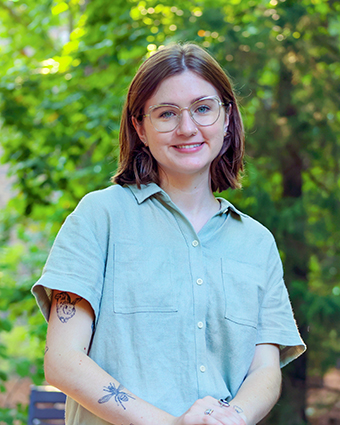Meet the JD Class of 2025
The 225 students in Duke Law School’s JD class of 2025 come from 35 different U.S. states and territories and nine other countries and represent 109 different undergraduate institutions. Six members tell why they chose Duke Law and how they hope to use their law degree to make an impact.
 Noah Buyon
Noah Buyon
After graduating from Georgetown University in 2017 with a degree in history, Noah Buyon enrolled at Central European University in Budapest for a master’s degree in nationalism studies. It would be an intellectually formative year as the class considered questions of statehood, citizenship, self-determination, pluralism, and globalization in a country wrestling with such issues itself under the leadership of populist Viktor Orban.
“It was a time of enormous political ferment that in many ways previewed some of the upheavals that are going on in this country right now. I had the sense of being present as history was being made,” Buyon says.
Buyon is one of 225 members of Duke Law’s JD Class of 2025, one of the most diverse classes in school history, with students of color accounting for a record high 44% of the class and record percentages of Latinx and Asian American students.
More than one-quarter of the first-year JD class are the first in their family to go to college or professional school, and 10% are international students. Twenty-two percent of 1Ls reported that they identify as LGBTQ+. For the fifth year in a row, women comprise more than half of Duke Law’s entering JD class; another 1% identify as non-binary.
All hope to use their law degree to make an impact, from improving the lives of migrants in the American South to holding nation states to account on a global stage.
Buyon was drawn to Duke Law by its JD/LLM in International and Comparative Law program, its International Human Rights clinic, and the opportunity to connect with faculty and a community “who have a knowledge base that spans the entire world.” That includes Harry R. Chadwick, Sr. Professor of Law Laurence R. Helfer, an expert on international law and institutions, international adjudication, and human rights who will begin a four-year term as the U.S. representative to the UN Human Rights Commission in 2023.
“I can’t wait to get professionally acquainted and I’m so excited about what he represents, which is America’s re-engagement with international human rights mechanisms after consciously disengaging,” Buyon says.
Buyon spent several years after graduation as a research analyst at Freedom House, an organization that works to expand freedom and democracy around the globe. His job, he says, was to be a “professional witness” by tracking and recording threats to democracy in Central and Eastern European nations, such as election manipulation by the government in Hungary and human rights abuses in Belarus.
“That’s a responsibility we took very seriously because we understood that in some ways, the only justice that people struggling against autocrats will ever get is historical justice, and to achieve historical justice you need a record.”
Becoming a lawyer, Buyon says, will empower him to actually make change through a planned career in litigation and enforcement of international commitments to democracy and human rights.
“To the extent that I can be involved in what’s known as strategic litigation or impact litigation, either at the European Court of Human Rights, which is the Council of Europe treaty court, or the European Court of Justice, which is the European Union treaty court, I will consider myself lucky and fulfilled,” Buyon says.
“With a law degree I will be equipped with the knowledge and skills to at least help these organizations inch closer towards realizing their stated purpose.”
Buyon, a New Yorker, says he’ll enjoy spending three years in Durham, where he can sample Southern barbecue and build relationships with classmates and faculty in a supportive and collegial environment. He’s eager to get involved in pro bono work – “Human rights begin at home, and Durham is my home right now,” he says – and after having witnessed voter disenfranchisement around the world, he’s looking forward to casting a ballot where his vote will make a difference.
“I’m really excited to vote in North Carolina,” Buyon says. “I have never lived in a so-called purple state before and I hope that anyone reading this registers and gets out to vote in November.”

Born in China and educated in Utah and California, Tianyu Wang also is new to North Carolina and is already reveling in its lush green golf courses. Golf and baking are favorite stress relievers for the multifaceted 1L who earned two bachelor’s degrees at the University of Southern California, one in psychology and one in business administration, and attending law school in a less hectic milieu was a calculated move.
“One of the biggest deciding factors in wanting to come to Duke was its small size and fast-paced, close-knit learning environment,” Wang says. “I attended a small high school and I really appreciated the learning and discussion that you could have in smaller classes. Going to USC for undergrad, that’s one of the things that I missed most.
“And one wonderful thing about Duke Law that I hadn’t considered before applying is the sense of community here. Everyone is so nice and collegial, and that’s one of the things that I have really liked so far. I’m really happy about that.”
Wang traces her interest in law to “Legal Seminar,” a Chinese TV program her parents watched. As a child she would listen, rapt, as lawyers discussed how statutes applied to cases: “I was just so fascinated by the legal reasoning and structure, and how tightly everything fit together.”
While at USC, Wang learned about entrepreneurship first-hand as a founding board member of The Shaukat Initiative, an organization developed by students to provide supplementary education to children of lower-income university staff and local high school students. The program gives participants the chance to explore their intellectual interests in stimulating classes led by USC undergrads and graduate students.
“We were so fortunate to have the kind of education that you can get at a university like USC that we wanted to give back, Wang said. “And it also gave USC students the opportunity to design and teach their own class on something that they are passionate about.”
Helping to build The Shaukat Initiative from the ground up gave Wang a taste of the skills needed to start a business, including marketing, crafting policies, writing funding proposals, forging a partnership with the university, reaching out to faculty and the community, and more. “It was one of the most beneficial experiences I’ve ever had,” she says.
For two years Wang also used her psychology training as a researcher at the Child Interviewing Lab at USC’s Gould School of Law, a research and training center for facilitating forensic disclosure by children about abuse and violence while reducing the trauma of testimony. She remained at the lab for a year after graduation and hopes to continue her advocacy during law school through the Guardian ad Litem pro bono project.
“I really liked working with children and younger teenagers, and I also just love working with people and trying to figure out the best way to help them using research,” Wang says.
Wang muses that the field of white-collar defense may fit well with her interests in business, criminal law, and working with clients, but is open to exploring other paths. For now, she’s looking forward to hands-on opportunities to lift people up, such as pro bono service and the Community Enterprise Clinic, in which student-attorneys work with nonprofit organizations and social entrepreneurs.
And golf. Wang has already played the Duke University Golf Club and wants to experience more of North Carolina’s vaunted courses before returning to the West Coast after graduation. The greens may be dry and yellow amid California’s historic drought, she says, but at least there are no mosquitoes.

Eduardo (Eddy) Fernandez knows he’ll leave North Carolina after graduation but intends to return home one day. Fernandez grew up in Siler City, about an hour from Durham, and studied public health, health policy and management at the University of North Carolina at Chapel Hill. Following graduation in 2019 he worked as a research analyst at the National Academy for State Health Policy (NASHP). Fernandez is now pursuing his JD and completing a Master of Public Policy degree with an eye toward addressing the social determinants of health, such as housing, income, and access to food, from a legal and public policy lens.
“My route to law is more cumulative than just one thing that happened,” Fernandez says. A health law class in college piqued his interest, and he had a front-row seat at NASHP as Texas v. Azar, an effort by 20 states to overturn the Affordable Care Act, wended its way through the courts. His focus on health policy has evolved to include an interest in environmental factors and how they affect people’s mental, physical, and spiritual health.
“So many things are going to happen in the next years and decades that will require people who have a decent knowledge of how health and environment are intertwined,” Fernandez says. “I want to try and fill that space from a legal and public policy background.”
With many friends and family members in the area, Duke was an obvious choice for law school. Knowing he will likely move to Washington, D.C., Chicago, New York, or Boston after graduation, Fernandez says the Duke brand will enable him to practice anywhere and eventually come back home. He also was drawn by Duke’s strong environmental program, especially the Environmental Law and Policy Clinic, a joint venture of Duke Law and the Nicholas School of the Environment.
“And I constantly heard about community,” Fernandez adds. “When I was in undergrad, the program I was in was also cohort-based, with about 40 students. It was really collaborative. I always said that I learned just as much from my peers as I did from professors, and that was something I could see happening here as well.”
Fernandez plans to get involved in the National Lawyers Guild to connect with progressive-minded peers, as well as the Health Law Society and Latin American Law Students Association (LALSA) and OutLaw affinity groups. He’s also interested in pro bono work through the Environmental Law Society and Health Care Planning Project.
Duke feels very different than UNC in politics and administration – “in a good way,” Fernandez adds. But as happy as he is at Duke Law, Fernandez will be a loyal Tar Heel come November.
“I will be sticking to my roots for basketball season,” he affirms. “I’m very ready to show my UNC colors.”

Sydney Colopy, a dedicated Blue Devil camped out in front of Cameron Indoor Stadium for three of her four undergraduate seasons at Duke to get into the annual Duke-UNC men’s basketball game, one of the hottest tickets in sports.
“Most of my spare time, especially in the spring, is dedicated to Duke basketball,” says Colopy, who graduated in 2019. “The only reason I didn’t tent for four years was I had hip surgery and was physically incapable of getting into a tent. I was definitely raised a Duke fan from day one.”
Colopy has strong ties to Duke, with alumni in her family dating back four generations to when the university was known as Trinity College. While she grew up in the Washington, D.C. region, Colopy spent her senior year of high school at the University of North Carolina School of the Arts, a conservatory in Winston-Salem where she studied ballet.
“I grew up dancing ballet pretty seriously from elementary school through high school, so it was a huge part of my life,” she recalls. “When I was looking at colleges, I wanted a school that had both the academics and a way I could keep dancing at a high level but for fun, and Duke was the perfect school for that.”
Colopy even wrote her college admissions essay about her favorite ballet role: a part at the beginning of the snow scene in George Balanchine’s “The Nutcracker.” She continued dancing and performing at Duke through the Dance Program and Devils en Pointe, a student-run ballet company, while majoring in public policy and French.
“It was nice to have the choice of dancing on my own terms, and using it more as an outlet than as something that I had to do,” she says.
Colopy also discovered a passion for environmental and climate work at Duke and interned with the League of Conservation Voters through the Nicholas School’s Stanback Fellowship Program. Following graduation she moved back to D.C. to work at the State Energy & Environmental Impact Center at NYU School of Law, a think tank that assists state attorneys general in promoting progressive environmental policies and defending against regulatory rollbacks. There, she met and was mentored by some of the top environmental lawyers in Washington and New York.
“The attorneys I worked with at the State Impact Center really helped me understand what was possible to do as a lawyer in the field,” Colopy says. “They helped me throughout the process of applying to law school, giving me a lot of advice on what schools would be best for me. Without them, I would have been totally lost throughout that process, but they were amazing resources.”
With a location and culture she already loved, it was natural to return to Durham for law school. Colopy says she remains passionate about environmental law but is open to exploring other areas and taking advantage of collaborative opportunities such as Oceans@Duke, an interdisciplinary ocean sustainability community on campus.
“I’m very much focused on community and collaboration and collegiality,” Colopy says. “Duke students really care about that. They put their time into making the school better, and to being part of the community at Duke and the broader community in Durham. I think all of those things add up to make Duke the best fit for me.”

Tyler Wallace was raised in the Washington, D.C. area but moved to Los Angeles for high school to pursue a childhood dream of becoming an actor. That dream morphed into a passion for filmmaking that further developed at Dartmouth College, where Wallace studied economics and philosophy and delved into film history and theory.
“When I went to Dartmouth, I realized that a lot of my interest in film was the result of my curiosity about how the world works,” Wallace says. “Filmmakers get to explore really big, interesting questions that are important to people, questions not only about what is but what could be, and then share their discoveries and impressions with a global audience.”
His studies in philosophy provided a context and lens through which to ask big questions about the social and economic frameworks by which nations and communities are organized, enforced, and ultimately reinforced by laws.
“Reasonable people differ on what should be done about social problems, so what are the unarticulated values and assumptions that are forming their consciously held beliefs? Getting behind the curtain, that is where I started to realize that this is where drama comes from, that these conflicts or tensions that we explore in our stories are downstream of these diverging value systems,” he says.
Wallace has followed his curiosity around the country, from Boulder, Colo., where he spent several years working on media projects including the documentary WeRiseUP, to Asheville, N.C., where he and his fiancée, both environmentally conscious, moved in 2020 to live in an intentional community that was closer to family. They felt at home in North Carolina, and it was there Wallace realized he wanted to pursue a law degree. Ultimately he chose Duke Law for its own intentional, intimate feel and opportunities such as the Community Enterprise Clinic, the Civil Justice Clinic, and the Movement Lawyering Lab externship, in which students learn how lawyers can contribute to social movements by collaborating with organizers.
“Having the opportunity to live in a number of states and different regions in the U.S. was a huge privilege and very informative. I got to orient myself on this land and develop a kinship with entrepreneurs, artists, and activists across the country who are working to improve their communities. Ultimately these experiences led me to law school with a very different perspective and a clarified understanding of what I’d like to do as a lawyer,” Wallace says.
“I am interested in civil rights law, economic equality, and social justice work generally, and there are a lot of practice areas that impact that space. I’d like to synthesize my interest in policy and systems change with community engagement and governance to ensure that intended policy outcomes are realized at the local level.
“Duke has a culture than encourages passionate engagement with the challenges in the world, but there is also a humility and a groundedness about the culture that is really appealing to me.”

Taylor Dempsey’s passion for immigrant justice started to crystallize during high school, when the born Memphian taught English as a Second Language at a local organization called the Refugee Empowerment Program. Dempsey learned firsthand the personal daily impact of harsh immigration policies on people seeking safety and opportunity in the U.S.
“The Refugee Empowerment Program was the first thing I did that had nothing to do with my family, nothing to do with anything that I knew previously,” she recalls. “It was definitely a glass-shattering moment where I had to start really critically thinking about how I believed the world worked, and what I thought about people and my community.
“I saw the fear that people still lived in, the institutional racism and the xenophobia, and all these things that I hadn’t had to think about but really dominated these peoples’ lives. So it made me really dedicated to that work.”
Dempsey went on to excel at The University of Tennessee, Knoxville, where she was in several honors programs and designed a major, Migration Studies. Through studies and volunteer work teaching ESL, Dempsey connected with leaders in Knoxville’s immigrant justice community and got involved in a fight against the 287(g) program, through which local law enforcement officers are authorized to perform some functions of federal immigration agents.
“I got very connected to both immigrants themselves and people working to change immigrant policies in the state and local areas,” Dempsey says. “As I worked more with the people that were directly impacted by the program and people that were working against the program, I realized how powerful an attorney can be, both in terms of having someone on your side when you’re going through one of the scariest things a person can go through, and also on the much larger scale of pushing back against these racist and unjust policies, so that’s the first moment I thought, ‘I’m going to go to law school.’”
Dempsey was a campus leader at UT-K, leading service learning trips for students through a program called VOLbreaks and co-founding a group called Students for Migrant Justice, all while interning at local immigrant organizations, working as a research assistant, training undergraduates as legal observers through the National Lawyers Guild, and giving a TedX talk on sustainable community service.
“A major impetus in my campus leadership was seeing how little students were involved in the community in which we lived. A lot of students felt we lived at UT and not in Knoxville.”
Upon graduation Dempsey received the Torchbearer award, the university’s highest honor for students demonstrating academic achievement and outstanding commitment to others.
Dempsey already has a long list of student groups and activities to get involved in at Duke Law, including the National Lawyers Guild, OutLaw, the Duke Immigrant and Refugee Project, the Clemency Project, and the Immigrant Rights Clinic and Criminal Defense Clinic. With its strong offerings in “crimmigration” – the intersection of criminal and immigration law that is their career focus – as well as a location close to home, choosing Duke for law school was easy.
“I committed before I had been here, but when I came for the first time for admitted students day, I told my dad I have never been more confident in a decision,” Dempsey says.
“I love being from the South. I want to stay in the South and practice in the South, and I really wanted to learn and have these experiences in the context in which I would use them. Duke also made it very clear that they value community and collaboration and I was really confident that those values would make my experience a lot better and more aligned with what I want to do and the type of lawyer I want to be.
“Between all the really cool opportunities and a setting that’s similar to where I will be practicing in the future, in a strong community, I was leaning towards Duke from the very beginning.”